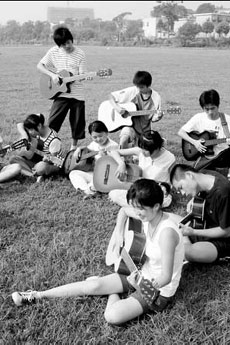Higher learning curve
|
Some students tend to lead anonymous lives on campus. Wu Changqing |
Making friends on campus seems to be mission impossible for many university students in Beijing. "College life is so different from what I expected in terms of making an intimate friend," says Zhang Yan, a sophomore at China Foreign Affairs University (CFAU).
"I used to imagine that university is a sort of paradise, where many parties take place and where you can make a lot of friends, like what we see in TV serials," says the 20-year-old Beijing girl, her big eyes staring out blankly from behind her glasses.
The only child of her parents, Zhang had never lived in a dorm shared by six roommates before 2005 when she was accepted to the English Department of the CFAU, a university where future diplomats sharpen their wits and broaden their knowledge.
Zhang says the friends she has made at university are not as close as those she made in high school. "I always feel there is an invisible barrier between us. We don't hang out together very often. Rather, I don't like going out with them," she says.
Zhang once went to a restaurant with two roommates. After they ordered three bowls of porridge and a serving of spring rolls, one of her roommates asked the waiter how many rolls there were in a serving to ensure that the number was even.
"She acted as if were any one of us to eat one more roll than her, she would suffer a great loss," Zhang says, attributing her roommate's penny-pinching act to her background from a small southern city.
Apparently, different family and economic backgrounds present obstacles to forging close relationships, according to a survey report written by Yan Yongjun with the Chinese Academy of Social Sciences and recently published on the Chinese Web site www.sociology.cass.cn.
Of the 700 college and university students surveyed in Zhengzhou, capital city of Central China's Henan Province, 72.7 percent said that they had difficulties making friends on campus, and that most of their close friends were from high school; only 18.2 percent said their close friends were those from university.
Zong Min, psychology consultant with CFAU, believes one reason students feel isolated in college is that "many of them have an unrealistic picture of friendship before starting college life".
"They imagine relationships full of sincerity and sentiment, which do not exist. Their different backgrounds deepen the isolation. Honest communication is, probably, the only way to break the ice," says Zong.
According to Yan Yongjun's report, it usually takes a college student an average of 24.6 hours a month to handle their close friendships, which could include writing letters, making phone calls, and hanging out. In contrast, only 6.3 hours are spent with acquaintances.
In other words, every day, people spend less than 15 minutes to communicate with acquaintances. "In such a short time, how can acquaintances possibly turn into intimate friends?" asks Zong Min.
"College students are faced with job-hunting, post-graduate entrance examinations, or even romantic relationships. To play multiple roles needs much more time," she points out.
"In addition, open communication and close friendship are hindered by college students' excessive alertness. Students seal themselves in a protective cocoon. If you visit the dormitory, you'll find that a number of bunks have curtains. It is a kind of self-protection."
How students think friendship and what values they adhere to are influenced by their environment. Some students complain about the lack of trust.
Yu Ying, a sophomore majoring in physics at Beijing Normal University, cannot forget what she once encountered. She saw a little girl struggling to push a bike up to an overpass and stepped forward to give her a hand. But, another student passing by remarked that Yu was pushing the bike just to get it out of her way.
|
Students in Anhui Province fine-tuning their friendships. Cheng Qianjun |
"That experience made me feel that it was not even safe to help someone out," she says.
Some people complain that college students are way too practical and selfish. "Impure" is a term used by many interviewers to describe friendships in university.
Zong Min says that some students are unable to make intimate friends because "they are unwilling to".
She points out that many students are living in a cocoon of prejudice, fear and distrust. "Only when students are willing to walk out from the cocoon will more butterflies fly on campus. Then students will find it possible to forge close friendships," Zong says.
Indeed, open communication has helped Liao Shuang of Beijing Normal University find true friends.
Liao has a T-shirt of very special sentimental value. On the back of the T-shirt are six blue letters that read Fan303. It is surrounded by 20 nicknames.
One of Liao's girlfriends has a boyfriend who lives in a dorm numbered 303. "We got to know her boyfriend, and her boyfriend's roommates. One day, we found this circle had already expanded like a snowball from a couple of nodding acquaintances to 20 close friends," Liao says.
And the secret of staying friends is their "shuttlecock time".
Every night, from 10 to 11, in a corner on campus, the Fan303 group gets together to kick shuttlecock. "During this time, we discuss the problems we had during the day. Troubles are poured out, and pleasures shared," Liao says.
Communication has also emboldened Yu Jian, a member of the Fan303 group. The young man used to be so shy that he did not even know which was the north gate of the university after spending four years there.
"When he joined us kicking shuttlecock, we talked to him, listened to him, and gave him some advice. Gradually, he has become more sociable," Liao says.
(China Daily 09/13/2007 page20)
















